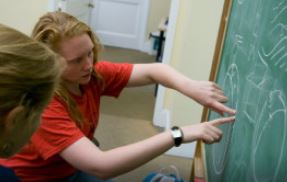Author: Guest107
-

Undergraduate Program Fall 2016 Teaching Assistant Positions
The Undergraduate Program in Sustainable Development is accepting applications for Fall 2016 teaching assistant positions.
-

Conflict, Displaced Persons and the Built Environment
Changing personal and social narratives can address issues of internal displacement in the built environment, as in this case in Medellín, Colombia.
-

When Environmental Oversight Takes a Back Seat
The government of Peru faces significant pressure to encourage growth and investment in the mining sector, but this has also put pressure on the government’s ability to properly assess environmental impacts.
-

Faculty Profile: Patrick Kinney
The New York metropolitan area and the far reaches of Kenya have benefited equally from Patrick Kinney’s work. Kinney believes that the harmony of all living things depends not only upon the well-being of people but on the health of the environment. His work is therefore motivated by the twin goals of improving public health…
-

Earth Institute Summer 2016 Internships
This summer, the Earth Institute is offering Columbia students opportunities to intern within various departments and research centers at the institute. All full-time Columbia and Barnard students are eligible to apply.
-

NYC’s Public-Private Partnerships to Fight Climate Change
New York City’s Carbon Challenge is helping to foster public-private partnerships that are crucial in any city’s attempt to combat climate change.



